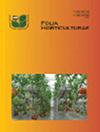Application of plant natural products for the management of postharvest diseases in fruits
IF 1.8
4区 农林科学
Q2 HORTICULTURE
引用次数: 15
Abstract
Abstract Prevention of postharvest losses has been a very important concern in the scientific world for many centuries, since adoption of an effective means to curtail such losses is believed to help in reaching sustainability in horticultural production and prevention of hunger around the world. The main means of deterioration in fruits, which may occur after harvest, include physiological changes/losses, physical losses, biochemical changes, changes in enzymatic activities and pathological deterioration. Among these, diseases cover the most important part; the losses due to diseases range from 5% to 20%, and this figure may extend up to >50% in the cases of certain susceptible cultivars. Fungicides have been the most important tool for the management of postharvest diseases for many years, together with hygiene, cold storage and packaging. However, due to the scientifically confirmed hazards of agro-chemicals on environment and human health, the acceptability of agro-chemicals decreased and scientists turned their attention towards natural alternatives. Most tropical and subtropical fruits contain a superficial cuticle, which helps them to regulate respiration and transpiration and protects against microbial decay. However, the waxy cuticle is generally being removed or damaged during washing or other handling practices. Therefore, the application of protective coatings (including wax) has been used in the fruit industry since the twelfth century, against microbial decay and for maintaining an acceptable standard of postharvest quality. This review aims to summarise and discuss the main natural products used for this purpose, to provide a broad-in-scope guide to farmers and the fruit storage sector.植物天然产物在果实采后病害防治中的应用
几个世纪以来,预防收获后损失一直是科学界非常关注的一个问题,因为采取有效的手段来减少这种损失被认为有助于实现园艺生产的可持续性和预防世界各地的饥饿。果实在收获后可能发生的变质主要包括生理变化/损失、物理损失、生化变化、酶活性变化和病理性变质。其中,疾病占了最重要的部分;由于病害造成的损失从5%到20%不等,在某些易感品种的情况下,这一数字可能扩大到50%到50%。多年来,杀菌剂与卫生、冷藏和包装一道一直是管理采后病害的最重要工具。然而,由于科学证实了农用化学品对环境和人类健康的危害,农用化学品的可接受性下降,科学家们将注意力转向了天然替代品。大多数热带和亚热带水果都有表皮,这有助于调节呼吸和蒸腾作用,防止微生物腐烂。然而,在清洗或其他处理过程中,蜡质角质层通常会被去除或损坏。因此,自12世纪以来,保护涂层(包括蜡)一直用于水果工业,以防止微生物腐烂并保持可接受的采后质量标准。本综述旨在总结和讨论用于这一目的的主要天然产品,为农民和水果储存部门提供广泛的指导。
本文章由计算机程序翻译,如有差异,请以英文原文为准。
求助全文
约1分钟内获得全文
求助全文
来源期刊

Folia Horticulturae
Agricultural and Biological Sciences-Horticulture
CiteScore
3.40
自引率
0.00%
发文量
13
审稿时长
16 weeks
期刊介绍:
Folia Horticulturae is an international, scientific journal published in English. It covers a broad research spectrum of aspects related to horticultural science that are of interest to a wide scientific community and have an impact on progress in both basic and applied research carried out with the use of horticultural crops and their products. The journal’s aim is to disseminate recent findings and serve as a forum for presenting views as well as for discussing important problems and prospects of modern horticulture, particularly in relation to sustainable production of high yield and quality of horticultural products, including their impact on human health.
 求助内容:
求助内容: 应助结果提醒方式:
应助结果提醒方式:


